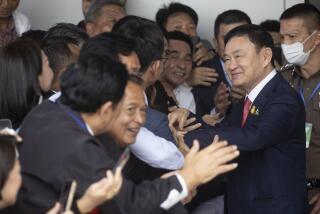Market Newsletter : What Does Thailand Really Need? You Name It : * Start with airports, phones, roads and better water. It’s basically infrastructure, and the government is promising quick action and vast improvements.
- Share via
BANGKOK, Thailand — Ask any businessman in Thailand what the country needs most, and the answer is invariably the same: infrastructure.
While the 1980s ushered in a period of unprecedented economic boom for Thailand, the economic takeoff was largely confined to the private sector. Meanwhile, roads clogged to a standstill with new cars, telephone customers waited years for a new phone and ports backed up with freighters waiting to unload.
Military regimes and the 1988 civilian government headed by Prime Minister Chatchai Choonhaven came up with plenty of high-priced solutions, but few of them were implemented. And now, as private sector investment levels off, the government appointed in the wake of the Feb. 23 military coup is promising quick action on a sheaf of desperately needed infrastructure projects.
Here’s a rundown on the building plans currently on Thailand drawing boards:
* NEW AIRPORT--Although the existing international airport at Don Muang is only four years old, its capacity is already being stretched and it will reach saturation in 1993. The government has drawn up plans for a second international airport at Nong Ngu Hao, about 18 miles east of the capital. Estimated cost of the new facility is $1.6 billion, but the price does not include roads or rail links. The proposed airport site is now a swamp so builders will need to sink thousands of plastic pipes to drain the water. The plan won governmental go-ahead on May 7.
* A MASS OF TRANSIT--Faced with growing traffic jams, the Bangkok authorities are considering five expensive plans to ease congestion in the Thai capital.
The best-known plan is Skytrain, a $2.2-billion elevated train system, which won initial approval in February. The 21-mile project is being developed by Canada’s Lavalin International Corp. and has received soft loan commitments from the Canadian government. One recent study said delays in approval had raised land acquisition costs to over $1 billion because real estate in Bangkok is skyrocketing in value, forcing an upward revision in the project’s total cost. The trains will be manufactured in Ottawa . . . .
A second train system is being proposed by Hong Kong’s Hopewell Holdings. The company wants to build a 32-mile elevated transportation system that includes a mass transit line, a freeway, a railroad line and a shopping plaza, all stacked on top of each other. Total cost is $3.2 billion . . . .
The two train lines are being complemented by three new freeways in Bangkok that are supposed to move traffic through the city’s clogged streets more quickly. One of the plans, the Don Muang Tollway project, a 10-mile stretch of highway, will cost $400 million and be finished by 1992. The “second stage expressway,” which will add 20 miles to an existing freeway, is slated to cost $1.4 billion. The third project, an elevated highway over one of Bangkok’s canals, is widely expected to be killed because it duplicates other plans . . . .
One problem that must still be worked out: What to do at the intersections of all the new transit plans. One government study said that because they were designed independently, the city would have to erect towers 270 feet high to allow the trains and highways to pass over one another . . . .
* NEW PHONES--One of the most controversial infrastructure projects is a plan to bring in 3 million badly needed new telephone lines through private enterprise. The government last week decided to renegotiate a contract awarded by the previous administration, producing the first serious rift between Prime Minister Anand Panyarachun and the military junta which appointed him. The army liked the original deal, and the outcome of the dispute remains in doubt.
The original telephone plan would have cost up to $5.94 billion and was billed as the world’s largest privately funded infrastructure project after the Britain to France Channel Tunnel. The project manager was to be a local firm, CP Telecommunications, which is proposing to work in conjunction with British Telecommunications PLC. The unusual financing proposal would give the company a 25-year concession to operate the phone lines in exchange for 16% of the revenues from Bangkok and 22% of the revenues from outside the capital. The plan drew fire for being too generous to the Thai company . . . .
* PRIVATIZING THE SKY--The effort to boost Thailand’s communications potential from its current rickety levels includes a plan to launch the country’s first telecommunications satellite. It will provide improved telephone and television links. The government is granting a concession to a Thai firm, Sinawatra Group, for 30 years, including eight years guaranteed without competition. Cost of the project is estimated at $1.6 billion. Current plans are to use a launch rocket from China or France. Talks are being held with America’s Hughes Aircraft and General Electric for the purchase of two satellites . . . .
* WATER TREATMENT--Much of the Thai capital’s real estate boom took place without adequate water treatment facilities being provided. Every day, more than 1.2 million cubic meters of waste are generated but the only sewer system is designed solely as a rain water runoff and dumps straight into the city’s rivers. Planners now say the capital needs up to 10 water treatment facilities costing an estimated $2 billion. A full-scale study has been ordered to be completed by the end of June, and construction is supposed to start by year’s end. Cost of the project, which will be privately operated, will be paid by charging large-scale users such as apartment buildings and hotels a users’ fee.
The Bangkok municipal government has also started construction of two separate but smaller treatment plants costing $21 million . . . .
* INDUSTRIAL ZONE--One way of overcoming a lack of infrastructure in Bangkok is to move business out of the congested city. Beginning in 1984, the government proposed setting up an industrial zone around the beach town of Pattaya, formerly known primarily as an “R&R;” spot for Vietnam-era GIs. The project, which is nearly complete, includes two new ports, one for containers, the other for petrochemicals. The ports link directly with large industrial estates, which are already filled with factories, or by rail to Bangkok. The total project is expected to cost $1.2 billion.
Needed: Innovative financing. With the central government unwilling to bankroll the entire infrastructure development plan, totaling tens of billions of dollars, most of the plans call for private financing such as long-term bonds. The projects will be operated under government-granted concessions by private firms for periods ranging up to 30 years.
So far, no American companies have cornered any of the lucrative construction business.
More to Read
Sign up for Essential California
The most important California stories and recommendations in your inbox every morning.
You may occasionally receive promotional content from the Los Angeles Times.










